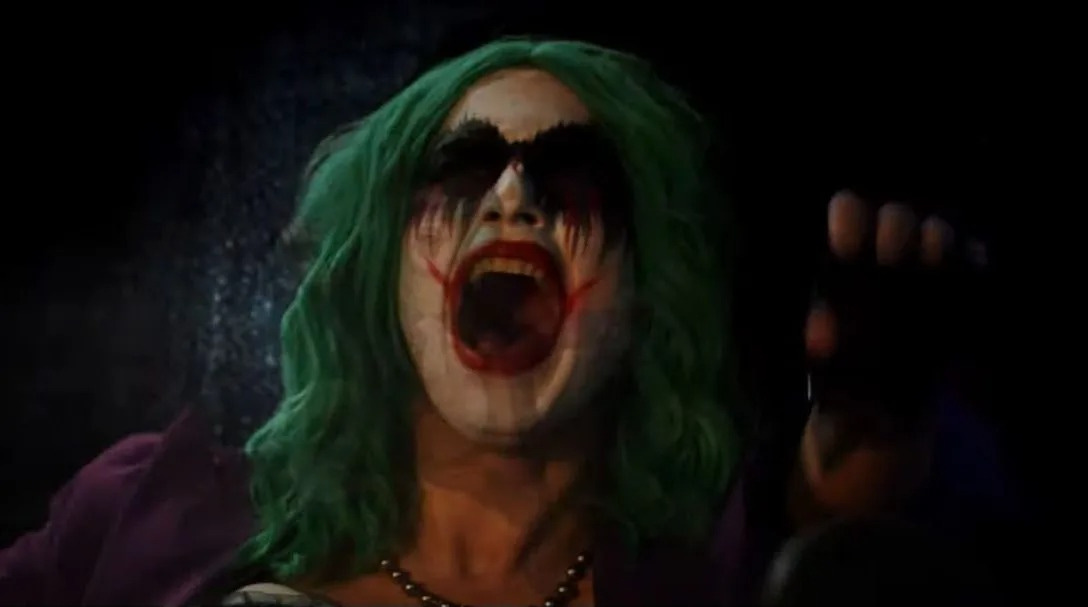The Weird Smile of the Mainstream
The People’s Joker is a brilliant queer self-creation
The opening text of Vera Drew’s The People’s Joker insists it’s a work of parody in order to try to fend off copyright lawsuits, but that’s the kind of polite fiction the rest of the film barrels through with a half cheerful, half enraged insouciance. A superhero adventure/comedy set/broken romance/trans coming of age/critique of all of those, the movie sprays genres on the wall like cheese whiz, and then rolls around in them giggling and barking.
The plot is more the floppy hat to distract you than the point in itself, but to the extent there’s a coherent narrative, it’s about how a trans girl from Smallville with a deeply terrifying and censorious mother (Lynn Downey) escapes to the big city to find herself and make subversive comedy. She’s joined by dropout friends like Penguin (Nathan Faustyn) as they defy the paranoid tech policing of Batman and the repressive guild of Lorne Michaels. Along the way, our heroine adopts the name the People’s Joker, starts wearing fishnets, and falls in love with deeply traumatized trans guy Joker (Kane Distler), a sweet savior who quickly turns dysfunctional and abusive (though never unsympathetic).
The storyline is mostly there for Drew to scurry away from, riff on, and yell at, because the film is about the way that mainstream culture is both a traumatizing heteronormative nightmare and a weird refracted, gloopily dripping resource for queer people.
Drew has to use the Batman mythos (and the Lorne Michaels mythos, and Hollywood training montages, and for that matter the queer coming of age story) because these pop culture touchstones define so much of how people of every gender and sexuality relate to our own identities and our own imaginations. For the director, and for lots of other people too, being a man, being a woman, being a success, being in love, being normal, being weird, are all modeled on billionaire Bruce Wayne’s trauma, billionaire Bruce Wayne’s weird rogue’s gallery, and Lorne Michaels’ punchlines.
Drew parodies the limits of those cishet white male pectoral boxes, but the parody is also an appreciation of the way that oddity and unmentionable fish smiles always lurk inside the tight bat-shorts of normativity. Poison Ivy and Catwoman and the Penguin and the Joker are all right there as potential queer icons, in various senses. The rigid world of right and wrong is also the world where animation keeps chewing off bits of reality, reminding you that what you’re seeing is just a representation, a sketch (comedy) of what’s supposed to be the (un)real deal. Tragic backstories are so repetitive you can turn them into a comedy routine; the multiverse offers infinite worlds including nonbinary puppets as deux ex machina. The mainstream is a bizarre place, which means that being alienated from it is an exercise in finding yourself there in that weird mirror, falling into a vat of chemicals and transforming, or wearing clown makeup and whatever costume makes you piss off computer generated Lorne Michaels/Mark Zuckerberg.
There’s definitely a parallel here with Jane Schoenbrun’s I Saw the TV Glow, another film about trans people finding themselves, and/or losing themselves, through or in pop culture. TV Glow is an abstract, weird Lynchian, surrealist film, but it seems positively conventional (at least narratively) compared to The People’s Joker.
That’s in part because while Schoenbrun treats pop culture as a dream that slips around conscious control, Drew foregrounds herself as a creator. She plays an artist in the film itself, but the mashup of genres, the occasional reflective voice overs, and the general air of low budget improvisation continually emphasizes that the film is not real—sort of the way a dream isn’t real, sort of the way pop culture is real, but especially the way that the story you tell when you play with a Batman doll or write fan-fiction isn’t real. The invention is connected to the world outside, but it’s also a private lump of sadness/joy/trauma/obsession/meaning which you are shaping yourself for your own amusement.
The narrative you make may or may not be empowering. But the fact that it’s something you’re making is a kind of victory. And that victory is highlighted when you do things with Batman that Batman isn’t supposed to do—like be a villain, or be queer, or be a backdrop for the discussion of your relationship with your homophobic mom.
The joy of the film is in part the rush of finding yourself where your self isn’t supposed to be. But even more it's the feeling of being the director of your own life and imagination, which means giving yourself permission to do weird shit with stuff that’s supposed to belong to the world, or to corporations, or to anyone but you.
The People’s Joker is brilliant because of its clunky low budget, because it treats plot, character, and reality as an ersatz facade, and because of its refusal to name its weird Batman and Penguin and Poison Ivy and Joker anything but the thing you name them when you’re willing to risk getting sued. It’s a movie that refuses to wear anything but the weird, lumpy, ill-fitting self it is. As such, it becomes the glorious, villainous scheme even Batman can’t crack.



Going to look for this now!
Amazing review! If this doesn’t get someone searching for where they can see The Peoples Joker then nothing will… or will it?!